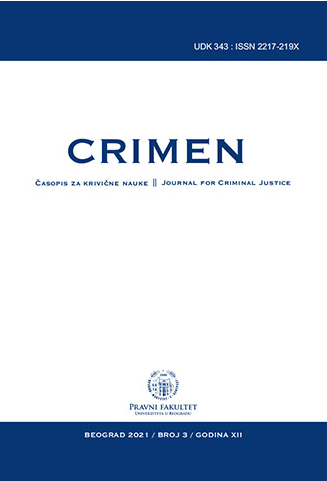PANDEMIJA KOVID–19 I PENITENCIJARNI SISTEM – prva iskustva
PANDEMIC COVID-19 AND THE PENITENTIARY SYSTEM - FIRST EXPERIENCES
Author(s): Đorđe M. IgnjatovićSubject(s): Criminal Law, Criminology
Published by: Правни факултет Универзитета у Београду
Keywords: penitentiaries; prisoners; health; staff; hygiene; racism; decarceration
Summary/Abstract: The C-19 pandemic, as a ‘mirror of truth’, showed the true face of modern societies, characterized by a general race for profit, lack of empathy, discrimination against numerous social groups, and even manifestations of racism. In the first months, before the vaccines (never faster created) were put on the market, the public authorities of most countries opted for strict measures that included locking and fundamental changes in the lifestyle of the entire population. Considering that the functioning of many institutions has been disrupted, the penitentiary system has been facing new challenges as well. Overcrowded institutions with a large number of persons in a health risk, with poor hygienic conditions and insufficient number of employees in health services were already a suitable environment for the spread of infectious diseases. These conditions have been neglected for decades. Now that a dangerous, easily transmitted disease has become a danger not only to prisoners, but also to prison staff, their families, and public health in general. It has become clear that something urgent needs to be done. Maintaining physical distance was usually not possible due to overcrowding, and palliative measures of organizational (expansion of the semi-freedom system) and architectural character (rearrangement of the institution’s space) did not yield results. After a lot of controversy and resistance, most countries decided to opt for decarceration – the early release of a large number of members of endangered categories of prisoners, including perpetrators of minor, non-violent crimes. However, it turned out that – without real preparation before release and without proper acceptance by probation services (especially in the case of socially vulnerable categories of persons, homeless and immigrants) – this measure did reduce the infection rate in penitentiaries, but further jeopardized public health. The pandemic has therefore showed that the penal system must undergo a fundamental transformation in which incarceration will be exceptional, an extreme measure to be replaced by a number of alternatives. Perhaps the citizens, after many traumatic experiences with several weeks of lockdown during which they were in fact deprived of their freedom of movement, will support more this change instead of the habit of succumbing to new waves of penal populism and retributivism.
Journal: CRIMEN - časopis za krivične nauke
- Issue Year: XII/2021
- Issue No: 3
- Page Range: 233-258
- Page Count: 26
- Language: Serbian

